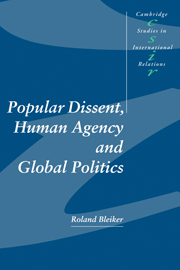Book contents
- Frontmatter
- Contents
- Acknowledgements
- Prologue: Theorising transversal dissent
- Introduction: Writing human agency after the death of God
- Part I A genealogy of popular dissent
- Part II Reading and rereading transversal struggles
- Part III Discursive terrains of dissent
- 7 Mapping everyday global resistance
- Second interlude: Towards a discursive understanding of human agency
- 8 Resistance at the edge of language games
- 9 Political boundaries, poetic transgressions
- Conclusion: The transitional contingencies of transversal politics
- Index
- CAMBRIDGE STUDIES IN INTERNATIONAL RELATIONS
9 - Political boundaries, poetic transgressions
Published online by Cambridge University Press: 23 October 2009
- Frontmatter
- Contents
- Acknowledgements
- Prologue: Theorising transversal dissent
- Introduction: Writing human agency after the death of God
- Part I A genealogy of popular dissent
- Part II Reading and rereading transversal struggles
- Part III Discursive terrains of dissent
- 7 Mapping everyday global resistance
- Second interlude: Towards a discursive understanding of human agency
- 8 Resistance at the edge of language games
- 9 Political boundaries, poetic transgressions
- Conclusion: The transitional contingencies of transversal politics
- Index
- CAMBRIDGE STUDIES IN INTERNATIONAL RELATIONS
Summary
To be a poet in a destitute time means: to attend, singing, to the trace of the fugitive gods. This is why the poet in the time of the world's night utters the holy.
Truth vanished once one came to terms with the death of God, once one accepted the impossibility of understanding the world in its totality, once one laid to rest the search for Archimedean foundations, be they theological, scientific or moral. ‘No god any longer gathers men and things unto himself’, Heidegger observes with a slight tone of regret. People have lost the ability to grasp, taste, apprehend, even imagine the location of the holy source of knowledge. Truth fell into a bottomless pit. But the fugitive gods still linger around the holy source and provide us with hints about its location – hints full of ambiguities and contradictions. Poetry, Heidegger claims, is the instrument that comes closest to apprehending these hints. It is the voice that senses the trace of the fugitive gods, stays on their tracks and shows to its kindred mortals ‘the way toward the turning’.
Heidegger's claims for poetry are, of course, overstated. Lyrics cannot leap beyond language games. But poetry is unique, and offers valuable insight, insofar as it engages the relationship between language and socio-political reality in a highly self-conscious manner. This is why it is worthwhile to preoccupy oneself with a form of speaking and writing whose impact remains confined, in most cases, to a small literary audience.
- Type
- Chapter
- Information
- Popular Dissent, Human Agency and Global Politics , pp. 244 - 272Publisher: Cambridge University PressPrint publication year: 2000
- 1
- Cited by



